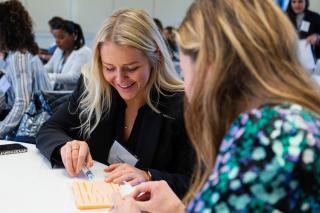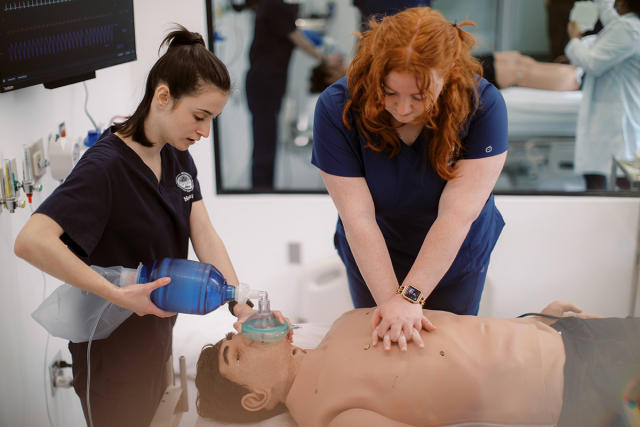Simmons School of Nursing students in the Online Family Nurse Practitioner (FNP) program and the Online Psychiatric Mental Health Nurse Practitioner (PMHNP) program came to campus for an Immersion experience in August. For insight into what this entailed, we spoke to Tina Delouchry, Professor of Practice and Director of FNP Clinical Education, and Laura Behm, Associate Professor of Practice and Director of PMHNP Clinical Education.
The Immersion experience for students in the Family Nurse Practitioner (FNP) program (online and on campus) and Online Psychiatric Mental Health Nurse Practitioner (PMHNP) is a unique opportunity to prepare them for clinical practice.
“At this point in the program, the students have completed the majority of their didactic coursework to qualify them for clinical practice,” says Tina Delouchry, Professor of Practice and Director of FNP Clinical Education. Most students in attendance are in their second year of the master’s program, and some are post-graduates.
Before beginning their clinical practice in their community, students visit the Simmons Nursing Simulation Center for an intensive immersion.
Hands-On Training in the Simulation Center
“The highlight is when students participate in hands-on workshops and simulations,” says Delouchry. These include head-to-toe and targeted physical assessments as well as workshops in suturing and dermatologic procedures, and EKG (electrocardiogram) interpretation.
“Students may begin immersion with a sense of uncertainty, but by the end of the week, they’ve enhanced their knowledge, strengthened clinical skills, and gained the confidence necessary to successfully transition into clinical practice as advanced practice nursing students,” Delouchry says. “This is getting them prepared so they feel confident and ready for their clinical sites.”
Laura Behm, Associate Professor of Practice and Director of the Online Psychiatric Mental Health Nurse Practitioner (PMHNP) Clinical Education, oversees students in her program who gather for Immersion.
While their focuses diverge, FNP and PMHNP students share some experiences during Immersion, thus benefiting from the interprofessional education. “We have amazing sessions geared towards the PMHNP role that provide so much benefit,” says Behm. During Immersion, experts in these fields provide their expertise in crisis management, addiction medicine, and trauma-informed care.
“It’s an amazing learning experience,” says Behm. “The students network [with each other] and create connections. They get to know each other and their professors, and benefit from that human touch.”
Feedback from faculty at this crucial juncture is key. “Students receive feedback on clinical skills in real time, and faculty are available to answer questions,” notes Delouchry. “[For online students], coming to campus creates a strong sense of community and belonging to Simmons. The faculty helps foster that in-person connection.”
Tracy McNeal ’26FNP echoed this sentiment. “I found the simulation labs at immersion were really helpful, especially the eye and ear exams,” she said. “As an online FNP student it was great to interact with peers in person and to engage with our instructors, [who are] clearly invested in our experiences and success.”
Jasmine Fu ’23 ’26MSN, a graduate of the Bachelor of Science in Nursing (BSN) and a current student in the Bachelor of Science in Nursing and Master of Science in Nursing 4+1 program, also appreciated the Immersion approach. "Faculty who were teaching the Immersion are passionate and knowledgeable on the subject they teach,” said Fu. “They also deeply care about helping students learn. I especially enjoyed the Dermatology workshop, where I had an opportunity to learn and practice hands-on techniques such as incision and drainage, skin biopsy, suturing, and stapling [using a suture practice pad].”
Now in her clinical rotation, Fu’s simulated experience has proved an excellent foundation for vital skills. “The workshop gave me the courage to attempt removing staples for the first time during my clinical rotation. It was a success!"
Clinical Placements
Beyond the Immersion experience, students benefit from the assistance Simmons faculty provide in arranging clinical placements.
“We still facilitate clinical placements,” says Behm, who has online students located in Nevada, Georgia, and North Carolina. “We have a team working very hard behind the scenes to build connections, arrange placements, ensure that training at local sites are completed, and keep the students informed.”
Each student is assigned a clinical placement specialist, a support unique to the School of Nursing programs at Simmons. “As a student, I had to secure my own clinical sites, and it was challenging,” says Behm. “It’s a huge support that Simmons provides to students to do the legwork on their behalf. It’s not standard that all schools offer that, and often clinical placement is a really challenging part of a nurse practitioner program.”
The online program has also established a strong network, with hundreds of partnerships with clinical sites across the country. “[These sites] have been vetted,” says Delouchry. “We know that our students will get a high quality clinical experience.”
Self Care for Healthcare Providers
“I love the Immersion experience!” says Behm. “Though it is a lot of work, and a lot of information to take in over a few days.”
The challenge itself creates the opportunity to develop coping skills. Behm holds self care briefing sessions throughout Immersion, focused on strategies for healthcare providers to take care of themselves in times of stress.
“We get overwhelming positive feedback from students about the networking, clinical insights, and wellness integration,” says Behm. “I love hearing the students say what they got out of the experience.” Students value the opportunity to get to know faculty and each other.
Once they begin clinical rotations, students attend a small group clinical decision making course to support the experience with faculty input. While the course touches on issues of wellness and self-care, most of the time is spent in clinical discussions. “I stay in close connection with students to make sure they are communicating frequently and getting a lot of support while they are in clinical,” says Behm.
The network of students built during Immersion helps, too. No matter where they are located, Online nursing students have a network they can rely on for support.
“As nursing students approach their clinical experiences, they know they have peers to talk to,” says Behm. “They are building their knowledge and their support network. That’s my favorite part of Immersion.”


